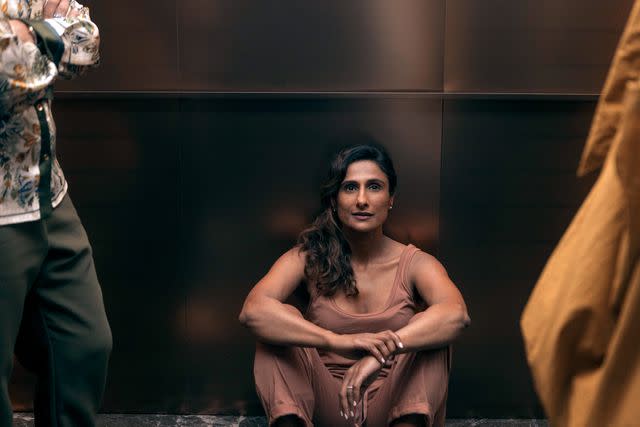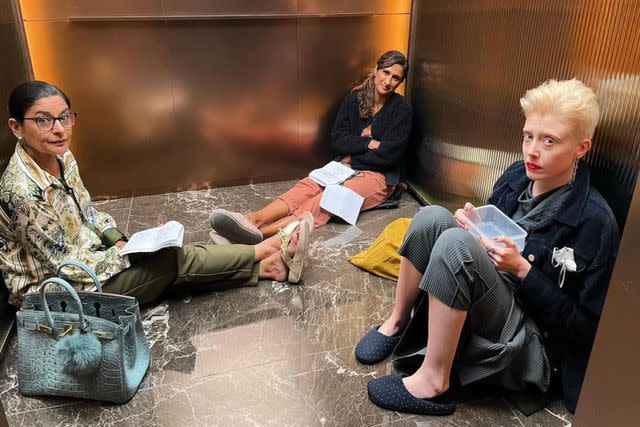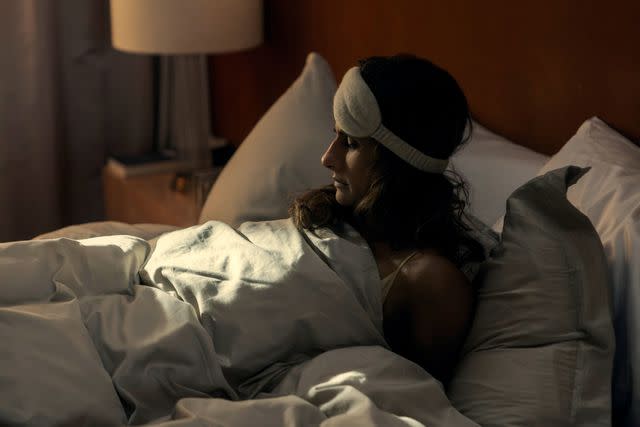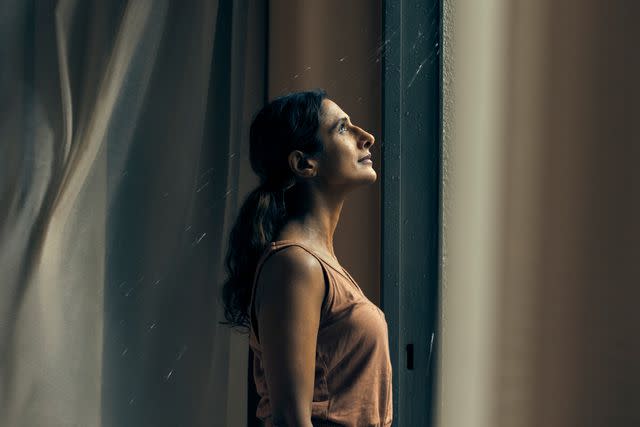“Expats ”star Sarayu Blue's claustrophobia helped her tap into the intensity of Hilary's elevator episode

The Hollywood vet dissects the illuminating episode 4 of the Prime Video limited series: "I got to sit there and just live in the tension that helped feed the story."
In episode 4 of Expats, Lulu Wang’s series about American expatriates who’ve put down roots in Hong Kong, all three of the women at the center of the story find themselves stuck.
Margaret (Nicole Kidman) is locked in a morgue with her husband (Brian Tee) after the two are summoned to the mainland to identify a body that could belong to their missing son. Mercy (Ji-young Yoo) is largely confined to the cramped bathroom of her shabby apartment after a positive pregnancy test. Hilary (Sarayu Blue), meanwhile, is literally stuck: in a broken-down elevator with her overbearing mother Brinder (Sudha Bhuchar), who is visiting from Los Angeles. In between bites of homemade pinni, the two spar over Hilary’s crumbling marriage. But Brinder comes bearing news: Your father is sick. Won’t you come home? In the dimmed elevator, decades-long trauma comes to light.
“It felt like doing a play,” Blue, 49, tells Entertainment Weekly of the episode. “I got to sit there and just live in the tension that helped feed the story, and that’s honestly the actor’s dream.”

Jupiter Wong/Prime Video
Sarayu Blue in 'Expats'Blue is an industry veteran who has lit up screens for the past two decades, headlining sitcom I Feel Bad and starring in the To All the Boys I’ve Loved Before films (plus, spin-off series XO, Kitty) and the limited series The Shrink Next Door, to name a few. But, in terrain still barren of diverse stories, playing Hilary was a turning point: “I feel like I've been seen in a way that maybe I never have before." Below, she dissects the episode.
ENTERTAINMENT WEEKLY: Would you rather be trapped in a morgue or an elevator?
SARAYU BLUE: This is a definite nightmare question because I’m claustrophobic, so I prefer not to be stuck anywhere. But I have to say I would pick an elevator over a morgue. The morgue feels terrifying.
Have you ever been stuck in an elevator in real life?
No, which is amazing. One time I was stuck on a subway train, but no.
What about a morgue? This is getting off to a great start.
I’ve never been stuck in a morgue, no! [Laughs] I love it.

Courtesy of Sarayu Blue
Sudha Bhuchar, Sarayu Blue, and Jennifer Beveridge on the set of 'Expats'Hilary’s elevator scenes are revelatory because they shed insight on why she doesn’t want children. Her relationship with her parents, especially her abusive father, is complicated and rooted in resentment. How did you tap into the intensity the episode required?
So much of that I have to give credit to the writing. Gursimran [Sandhu], who wrote that episode, wrote it with such authenticity and integrity that a lot of that comes up when I get into the real vulnerability and rawness of the monologue. And where it goes with her mother is so deep that it just would start bubbling up. In terms of not wanting to have children, what I love about this character is we got to see Hilary in this in-between place. We see the cold-hearted, career-oriented woman depicted pretty regularly, I think. What's great about Hillary is she's not career-oriented or cold-hearted. She just likes her life.
She and David got married and both felt like, yeah, we’re on the same page. I don’t think we want kids. We enjoy the life we’ve built together. And suddenly that gets diverted. David is suddenly like, I do want to be a parent. And you watch this woman really trying to be a good partner, but she’s abandoning her own self in the process. We see women abandoning themselves all the time. What’s beautiful about this storyline is it’s flipped. The assumption is we as women are going to want to have children, and if we don't, there's something wrong with us. She says to her mom in the elevator, “What if I like my life?” I still get goosebumps saying that. So much was given to me with this incredible script.
You filmed in an actual elevator. Did that present any challenges, especially considering your claustrophobia?
I think if anything, it was a gift. It did feel claustrophobic, but there was this ability to tap into that experience — not even my own anxiety, but just the tension of being stuck in any space with your South Asian mother. We all have very specific relationships with our families. The relationship between Brinder and Hilary/Harpreet is so authentic. What Sudha brought to that character was so real. It felt like doing a play. I come from a theater background. I got to sit there and just live in the tension that helped feed the story, and that’s honestly the actor’s dream. Most of us [actors] don’t get into acting to be comfortable. You have that pull to go into the world of an artistic life because the discomfort, in combination with creative fulfillment, is exciting.
Check out more from EW's The Awardist, featuring exclusive interviews, analysis, and our podcast diving into all the highlights from the year's best in TV.

Jupiter Wong/Prime Video
Sarayu Blue in 'Expats'You previously said you were terrified when you were offered the part. How long did that fear live in you?
There was a pretty low-grade fear the whole time, if I'm being honest. The fear around the claustrophobia factor, I was able to talk to Lulu, talk to our AD — I knew I was supported. Because of that, I felt like, okay, they're not going to torture me. I'm in good hands. I do think that's a very real thing that a lot of actors have to face; I empathize with any actor who's not working under conditions where they're really supported. As an artist being asked to grow and meet the work, that, for me, was throughout the entire filming process. I always wanted to do right by Hilary and the show. And because I was asked to work at a certain caliber that's so raw and vulnerable — I mean, even the stuff with her dad in the hospital — I was so scared to film that stuff. It’s so deep, and I know I can’t run from it. If I don't tell the whole truth in every moment, the story doesn't get served. So the only way I can do that is by really going there. I think the low-grade fear was always there.
I want to get your interpretation on the episode’s opening and closing sequences with Hilary. It begins with her asleep in bed and a butterfly flutters in from the window and into her mouth.
I think there’s an element of Hilary becoming a butterfly. There’s a reckoning. She’s breaking up with Margaret, breaking up with David, breaking up with the version of the family she's created for herself to please her family. Granted, you don't get there until episode 6, but when I think of the butterfly, I think of the caterpillar in the cocoon becoming a butterfly.
Yes, transformation. Then there’s the ending, where she opens all the windows during a big storm and greets the rain.
I love that moment. I think she finally feels the beginning of freedom. She's let loose this family trauma that has lived in her. She covered up these secrets both literally and figuratively for decades. I think that moment is the first moment she's meeting herself, free. Every time we tell the truth, it's liberating. She finally got to say the thing to her mother. It’s that moment of the freedom of getting to be her full self, and then we get to episode 6 and see where that leads her.

Jupiter Wong/Prime Video
Sarayu Blue as 'Expats'Has your own family tuned in and weighed in on the heavier moments?
My mother not only tuned in, she would watch multiple times and also send me basically a whole thesis about things, like what she understood from the themes. I'm very lucky in that my parents — my mom was a short story writer, my dad a professor — have artistic hearts. So it was more about her overall experience [from watching the show], what she understood, what she loved. It was never critical, which I have to say was surprising. Don't get me wrong, she's tough. She will let me know! But I think she really, really liked this show. She's grateful to have gotten to see me do something like this. She is my biggest fan. She has the I Feel Bad poster taped up on the wall.
Related: Where's Gus? Nicole Kidman and Brian Tee can't escape text messages asking about how Expats ends
What has the general reception been like since the finale?
My jaw continues to be on the floor. I'm really moved. I've been doing this for a few minutes now, and you really never know how a show or movie is going to be received. I feel deeply thankful because I feel like I've been seen in a way that maybe I never have before, and that's something that so few people get to feel. It’s something I want people to feel, especially Black and brown actors, LGBTQ+ actors, disabled actors. I want opportunities for all of us who don't normally get them to show the skill set that we have and feel valued, respected, and seen.
Expats is available to stream on Prime Video.
This interview has been edited and condensed for clarity.
Read the original article on Entertainment Weekly.


